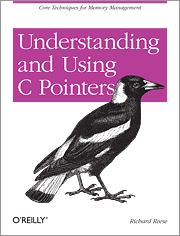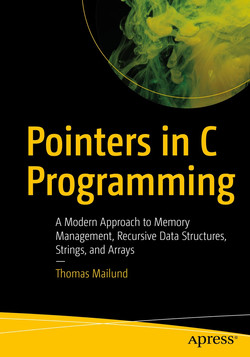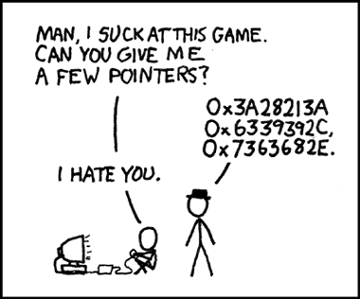A slow introduction to pointers in C
The C11 programming language has a very powerful feature
for addressing and modifying memory which,
for now,
we'll casually term "pointers in C".
- If used correctly pointers
can enable very fast, efficient, execution of C programs.
- If misunderstood or used incorrectly,
pointers can make your programs do very strange, incorrect things,
and result in very hard to diagnose and debug programs.
The primary role of pointers -
to allow a program (at run-time) to access its own memory -
sounds like a useful feature,
but is often described as a very dangerous feature.
There is much written about the power and expressiveness of C's pointers,
with general agreement that C's pointers are a
threshold concept in Computer Science.
(Recently much has been written about Java's lack of pointers.
More precisely,
Java does have pointers,
termed references,
but the references to Java's objects are so consistently and carefully
constrained at both compile- and run-times,
that little information about the run-time environment is exposed
to the running program,
and little can go wrong).
|

Pointers on C,
Kenneth Reek,
Addison-Wesley,
636pp, 1998.
|

Understanding and Using C Pointers,
Richard Reese,
O'Reilly Media,
226pp, 2013.
|

Pointers in C Programming,
Thomas Mailund,
APress,
537pp, 2021.
|
CITS2002 Systems Programming, Lecture 11, p1, 26th August 2024.
What are pointers?
We know that C has both ''standard'' variables,
holding integers, characters, and floating-point values,
termed scalar variables.
In addition, we've seen arrays and structures of these,
termed aggregate variables.
Let's follow this simplified explanation:
- We understand that variables occupy memory locations (1 or more
bytes) of a computer's memory.
- Each variable requires enough (at least) bytes to store the values the variable
will (ever) need to hold.
For example,
on typical desktop and laptop computers
a simple C integer will require 4 bytes of memory.
However a bool value, only requiring 1-bit, will typically occupy 1 byte.
- Similarly, an array of 100 integers,
will require 400 bytes of contiguous memory -
there is no padding between elements.
- Computers have a large amount of memory,
e.g. our lab computers have 16 gigabytes of memory (16GB),
or nearly 17.1 billion bytes.
- Each of a computer's memory bytes is uniquely numbered,
from 0 to some large value.
Each such number is termed the byte's memory address.
- We often refer to memory locations as just addresses
and the action of identifying an address as addressing.
|

|
With these points in mind, we can make 3 simple statements:
- Pointers are variables that hold the
address of a memory location.
- Pointers are variables that point to
memory locations.
- Pointers (usually) point to memory locations being
used to hold variables' values/contents.
CITS2002 Systems Programming, Lecture 11, p2, 26th August 2024.
The & operator, the address-of operator, the ampersand operator
The punctuation character &,
often pronounced as the address-of operator,
is used to find a variable's address.
For example, we'd pronounce this as:
int total;
.... &total ....
|
"the address of total",
and if the integer variable total was located at memory address
10,000 then the value of &total would be 10,000.
We can now introduce a variable named p,
which is a pointer to an integer
(pedantically, p is a variable used to store the address of a
memory location that we expect to hold an integer value).
int total;
int *p ;
p = &total ;
|
If the integer variable total was located at memory address
10,000 then the value of p would be 10,000.
If necessary (though rarely),
we can print out the address of a variable,
or the value of a pointer,
by first casting it to something we can print,
such as an unsigned integer,
or to an "generic" pointer:
int total;
int *p = &total ;
printf("address of variable is: %lu\n", (unsigned long)&total );
printf(" value of pointer p is: %lu\n", (unsigned long)p );
printf(" value of pointer p is: %p\n", (void *)p );
|
CITS2002 Systems Programming, Lecture 11, p3, 26th August 2024.
Dereferencing a pointer
We now know that a pointer may point to memory locations holding
variables' values.
It should also be obvious that if the variable's value (contents) changes,
then the pointer will keep pointing to the same variable,
(which now holds the new value).
We can use C's concept of dereferencing a pointer
to determine the value the pointer points to:
int total;
int *p = &total ;
total = 3;
printf("value of variable total is: %i\n", total );
printf("value pointed to by pointer p is: %i\n", *p );
++total; // increment the value that p points to
printf("value of variable total is: %i\n", total );
printf("value pointed to by pointer p is: %i\n", *p );
|
Even though the variable's value has changed
(from 3 to 4),
the pointer still points at the variable's location.
The pointer first pointed at an address containing 3,
and the pointer kept pointing at the (same) address
which now contains 4.
CITS2002 Systems Programming, Lecture 11, p4, 26th August 2024.
Dereferencing a pointer, continued
We now know that changing the value that a pointer points to
does not change the pointer (good!).
Now we'd like to change the value held in the address
that the pointer points to.
Similarly, this will not change the pointer itself.
int total;
int *p = &total ;
int bigger;
total = 8;
printf("value of variable total is: %i\n", total );
printf("value pointed to by pointer p is: %i\n\n", *p );
*p = *p + 2 ; // increment, by 2, the value that p points to
printf("value of variable total is: %i\n", total );
printf("value pointed to by pointer p is: %i\n\n", *p );
bigger = *p + 2 ; // just fetch the value that p points to
printf("value of variable total is: %i\n", total );
printf("value of variable bigger is: %i\n", bigger );
printf("value pointed to by pointer p is: %i\n", *p );
|
CITS2002 Systems Programming, Lecture 11, p5, 26th August 2024.
An array's name is an address
When finding the address of a scalar variable (or a structure),
we precede the name by the address of operator,
the ampersand:
int total;
int *p = &total ;
|
However, when requiring the address of an array,
we're really asking for the address of the first element of that array:
#define N 5
int totals[N];
int *first = &totals[0]; // the first element of the array
int *second = &totals[1]; // the second element of the array
int *third = &totals[2]; // the third element of the array
|
As we frequently use a pointer to traverse the elements of an array
(see the following slides on pointer arithmetic),
we observe the following equivalence:
int *p = &totals[0] ;
// and:
int *p = totals ;
|
That is: "an array's name is synonymous with the address of the first
element of that array".
CITS2002 Systems Programming, Lecture 11, p6, 26th August 2024.
Pointer Arithmetic
Another facility in C is the use of pointer arithmetic
with which we may change a pointer's value
so that it points to successive memory locations.
We employ pointer arithmetic in the same way that we specify numeric
arithmetic, using ++ and — —
to request
pre- and post- increment and decrement operators.
We generally use pointer arithmetic when
accessing successive elements of arrays.
Consider the following example,
which initializes all elements of an integer array:
#define N 5
int totals[N];
int *p = totals; // p points to the first/leftmost element of totals
for(int i=0 ; i<N ; ++i) {
*p = 0; // set what p points to to zero
++p; // advance/move pointer p "right" to point to the next integer
}
for(int i=0 ; i<N ; ++i) {
printf("address of totals[%i] is: %p\n", i, (void *)&totals[i] );
printf(" value of totals[%i] is: %i\n", i, totals[i] );
}
|
CITS2002 Systems Programming, Lecture 11, p7, 26th August 2024.
How far does the pointer move?
It would make little sense to be able to ''point anywhere'' into memory,
and so C automatically 'adjusts' pointers' movement (forwards and backwards)
by values that are multiples of the size of the base types
to which the pointer points(!).
In our example:
for(int i=0 ; i<N ; ++i) {
*p = 0; // set what p points to to zero
++p; // advance/move pointer p "right" to point to the next integer
}
|
p will initially point to the location of the variable:
- totals[0], then to
- totals[1], then to
- totals[2] ...
Similarly, we can say that p has the values:
- &totals[0], then
- &totals[1], then
- &totals[2] ...
CITS2002 Systems Programming, Lecture 11, p8, 26th August 2024.
Combining pointer arithmetic and dereferencing
With great care (because it's confusing),
we can also combine pointer arithmetic with dereferencing:
#define N 5
int totals[N];
int *p = totals ;
for(int i=0 ; i<N ; ++i) {
*p++ = 0; // set what p points to to zero, and then
// advance p to point to the "next" integer
}
for(int i=0 ; i<N ; ++i) {
printf("value of totals[%i] is: %i\n", i, totals[i] );
}
|
In English, we read this as:
"set the contents of the location that the pointer p
currently points to the value zero,
and then increment the value of pointer p by the size of the variable that
it points to"
🤪
Similarly we can employ pointer arithmetic in the control of for loops.
Consider this excellent use of the preprocessor:
int array[N];
int n, *a;
#define FOREACH_ARRAY_ELEMENT for(n=0, a=array ; n<N ; ++n, ++a)
FOREACH_ARRAY_ELEMENT {
if(*a == 0) {
.....
}
}
|
CITS2002 Systems Programming, Lecture 11, p9, 26th August 2024.
Functions with pointer parameters
We know that pointers are simply variables.
We now use this fact to implement functions that receive
pointers as parameters.
A pointer parameter will be initialized with an address
when the function is called.
Consider two equivalent implementations of C's standard
strlen function -
the traditional approach is to employ a parameter that "looks like" an array;
new approaches employ a pointer parameter:
int strlen_array( char array[] )
{
int len = 0;
while( array[len] != '\0' ) {
++len;
}
return len;
}
|
|
int strlen_pointer( char *strp )
{
int len = 0;
while( *strp != '\0' ) {
++len;
++strp;
}
return len;
}
|
|
int strlen_pointer( char *strp )
{
char *s = strp;
while( *s != '\0' ) {
++s;
}
return (s - strp);
}
|
|
During the execution of the function,
any changes to the pointer will simply change what it points to.
In this example, strp traverses the null-byte terminated
character array (a string)
that was passed as an argument to the function.
We are not modifying the string that the pointer points to,
we are simply accessing adjacent, contiguous, memory locations
until we find the null-byte.
CITS2002 Systems Programming, Lecture 11, p10, 26th August 2024.
Returning a pointer from a function
Here we provide two equivalent implementations of C's standard
strcpy function,
which copies a string from its source, src, to a new destination,
dest.
The C11 standards state that the strcpy function function must
return a copy of its (original) destination parameter.
In both cases, we are returning a copy of the (original) dest parameter -
that is, we are returning a pointer as the function's value.
We say that "the function's return-type is a pointer".
char *strcpy_array( char dest[], char src[] )
{
int i = 0;
while( src[i] != '\0' ) {
dest[ i ] = src[ i ];
++i;
}
dest[ i ] = '\0';
return dest; // returns original destination parameter
}
|
|
char *strcpy_pointer( char *dest, char *src ) // two pointer parameters
{
char *origdest = dest; // take a copy of the dest parameter
while( *src != '\0' ) {
*dest = *src; // copy one character from src to dest
++src;
++dest;
}
*dest = '\0';
return origdest; // returns copy of original destination parameter
}
|
|
Note:
- in the array version,
the function's return type is a pointer to a char.
This further demonstrates the equivalence between array names (here,
dest) and a pointer to the first element of that array.
- in the pointer version,
we move the dest parameter after we have copied each character,
and thus we must first save and then return a copy of the
parameter's original value.
- if very careful,
we could reduce the whole loop to the statement
while((*dest++ = *src++));
But don't.
CITS2002 Systems Programming, Lecture 11, p11, 26th August 2024.
|


 CITS2002
CITS2002 CITS2002 schedule
CITS2002 schedule